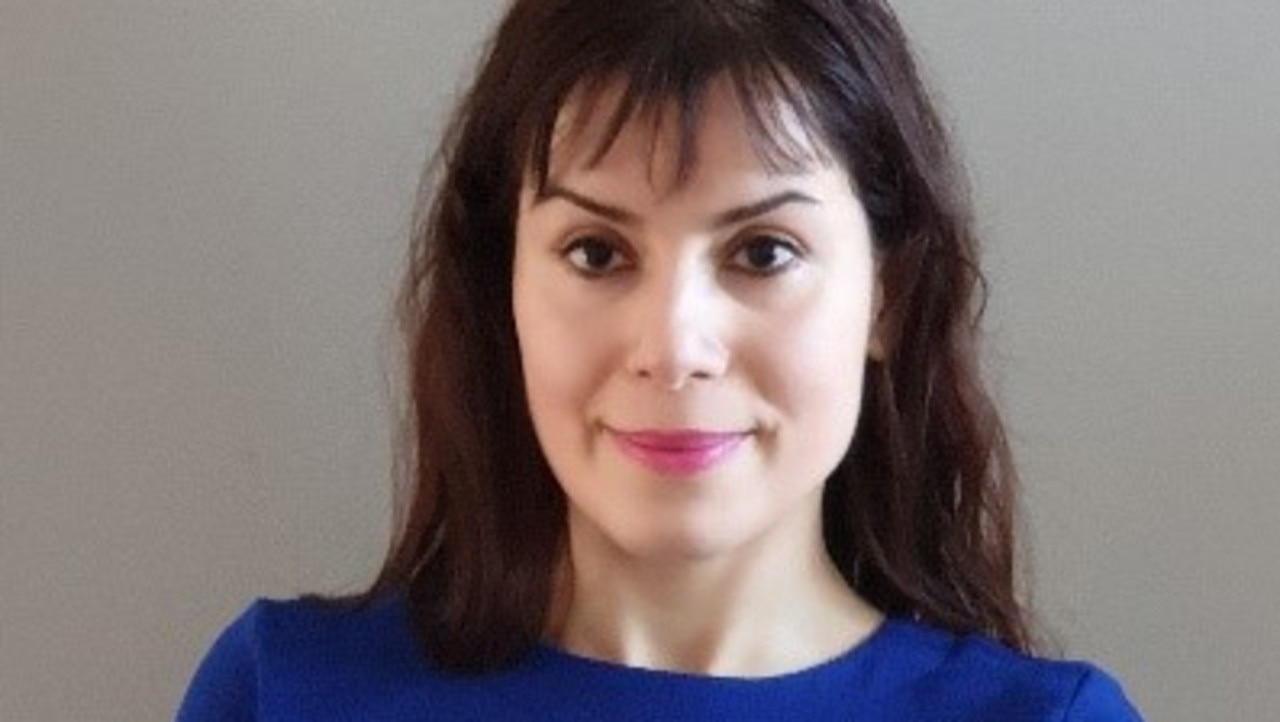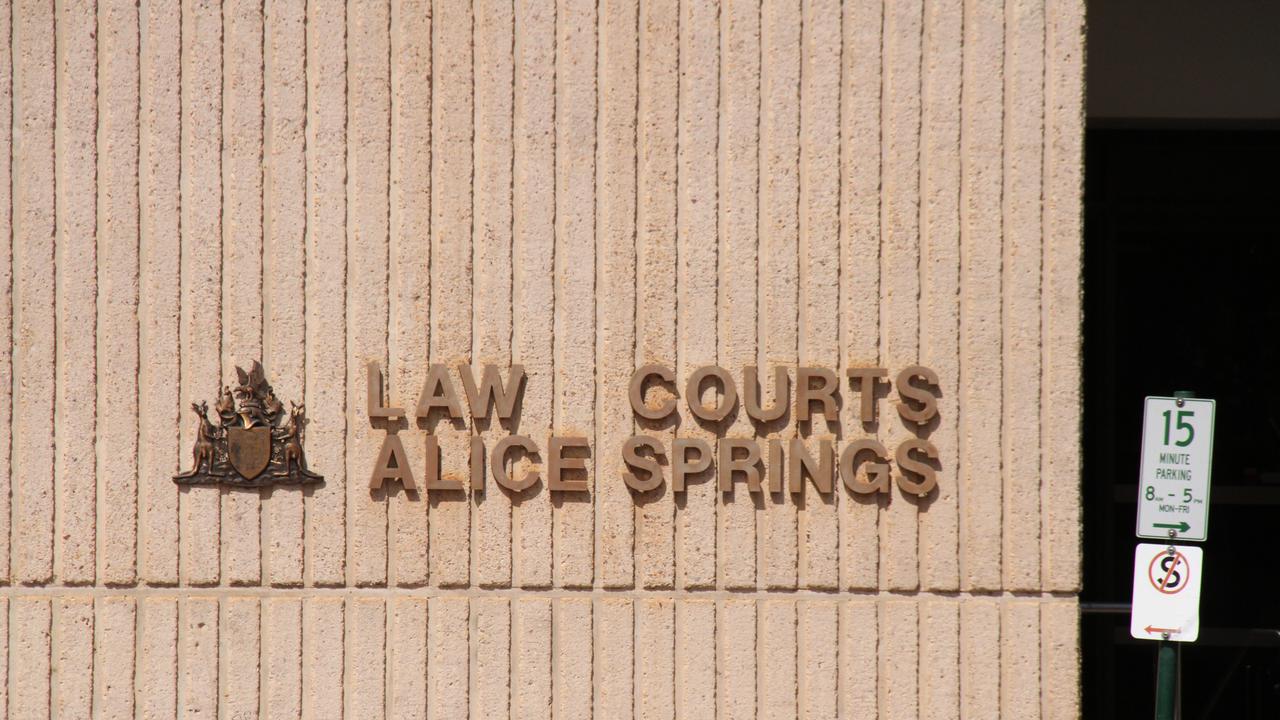Territory fuel prices continue to climb despite tariff cut
The NT government has responded to a surge in fuel prices which sees unleaded petrol hitting almost $2 a litre in Darwin despite a 22c-a-litre tariff cut in March.
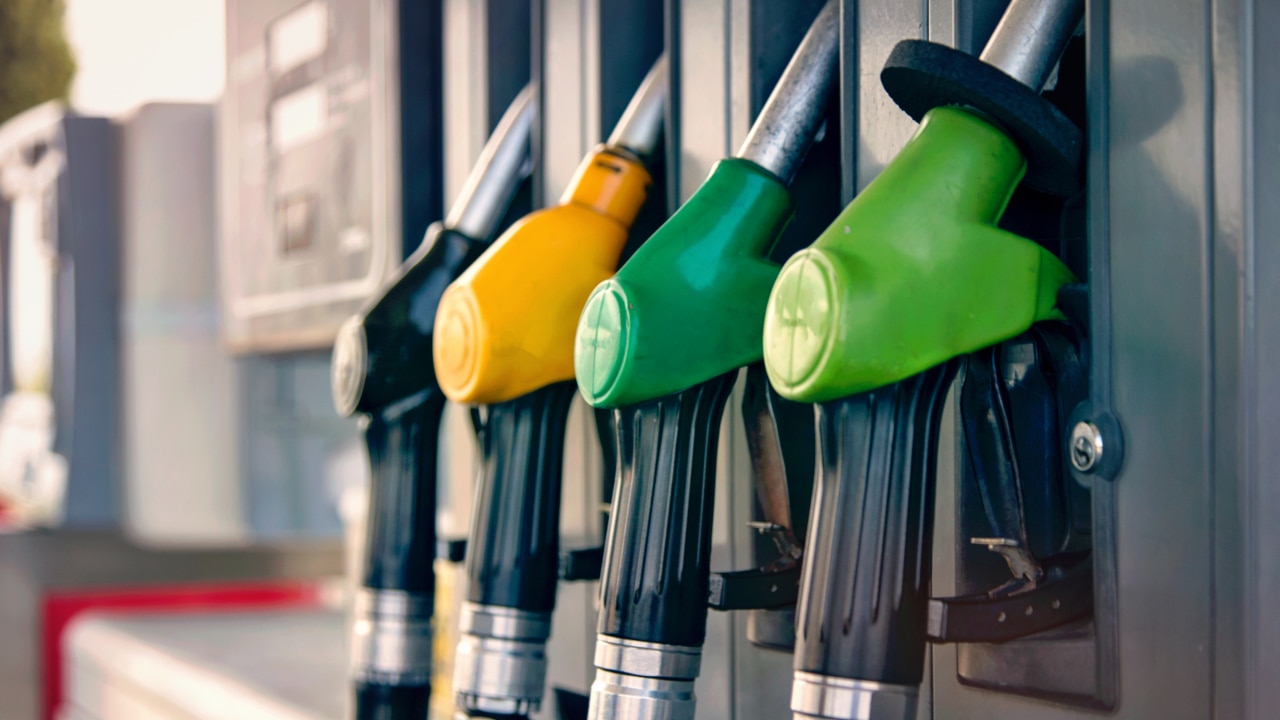
Northern Territory
Don't miss out on the headlines from Northern Territory. Followed categories will be added to My News.
THE NT government has responded to a surge in fuel prices which sees unleaded petrol hitting almost $2 a litre in Darwin despite a 22c-a-litre tariff cut in March.
On the weekend, motorists in Darwin were paying up to $1.99 a litre at the pump to fill their tanks.
Between March 30 and May 8, Darwin’s unleaded petrol retail price decreased by 22.7c a litre, falling as low as $1.80 a litre at some Top End outlets, on the back of the government’s 50 per cent cut to the fuel tariff.
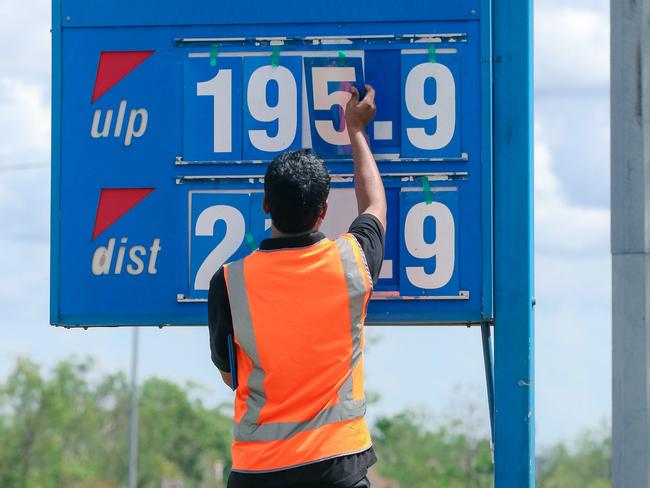
But in recent weeks the unleaded petrol price has surged amid fears a litre of unleaded petrol could again top the $2 mark despite the tariff cut, which is due to end in September.
A spokesman said the NT government had been following the gross retail margin and the ULP price had recently been tracking below the Australian average.
How the Territory Government can cut your fuel prices
THE Northern Territory Government has a legislative precedent that could allow it to pressure petrol companies into disclosing their profits and profit margins.
Introduced into the Territory Parliament in the dying days of the Giles Country Liberals Government, the Fuel Price Disclosure Bill was designed to name-and-shame price-gouging operators who ripped off unsuspecting Territory motorists.
The Bill, which didn’t pass through Parliament, has particular relevance now with the Northern Territory Treasury and peak roads organisation AANT identifying significant mark-ups at Territory service stations.
The Treasury this week identified a nation-high mark-up of 30.6 per cent on Territory fuel compared with 14.4 cents per litre nationally.
Several weeks ago AANT chief executive Anthony Hill identified a similar mark-up and sought intervention from the Australian Competition and Consumer Commission.
Speaking this week, he called for action to stop fuel companies and service stations from price gouging.
Territory fuel prices are usually set to the value of the most recent service station refill.
“I felt they had enough time to empty the tanks of the more expensive fuel and really that fuel price should have come down significantly,” Mr Hill said.
“Based on our historic data about seven to 10 cents is what they operate on above the Terminal Gate Price.
That’s what they put on their margin and they were operating around 35 cents per litre so it was obviously too high.”
Introduction of the Fuel Disclosure bill followed a 2014 petrol-price summit in Darwin that involved Government, the fuel companies and other stakeholders.
This was followed by a “please explain” from the Chief Minister to fuel companies which he said failed to secure ‘an adequate response’.
In a 2014 letter published in the Alice Springs News, Mr Giles said carriage of the Fuel Price Disclosure Bill would bring transparency to all levels of the fuel supply chain.
"The legislation will ensure that motorists can make informed choices about the companies operating here and how their prices are calculated," Mr Giles said.
"I know this won’t be popular with many fuel stakeholders but Territorians need to know why they are paying above the average."
Mr Giles said Territorians were ‘denied the answers they deserve’ by fuel companies at the summit.
"I am particularly disappointed at select companies’ refusal to give plausible reasons for the huge price spike …".
Soon after Mr Giles wrote this letter, the United independent fuel company established in Darwin and fuel prices across Darwin and much of the Territory stabilised.
It took two years and a Parliamentary Committee for the Disclosure Bill to be introduced to Parliament but it was never voted on because the petrol companies lowered their prices.
A spokesperson for the Chief Minister said Michael Gunner voiced concerns over rising Territory fuel prices.
“The Territory saw a significant dip following this - and the warning still remains in place today.”
THE SECRET REASON DARWIN PAYS MORE FOR FUEL
EARLIER, MAY 5: DARWIN fuel retailers are charging the highest mark-up in the country, a new NT Treasury report has confirmed.
A month after the federal government halved the fuel excise, Territory motorists continue to pay through the teeth because fuel retailers have failed to pass on the savings.
And in a separate study, the Australian Automobile Association shows Darwin motorists are paying second only to drivers in Hobart and Sydney for fuel.
The Treasury survey puts the average Darwin pump price for April at 185.7 cents per litre, compared to 171.9 cents per litre nationally.
For the same period the terminal gate price (wholesale price) was 155.1 cents per litre meaning the Gross Indicative Retail Difference (retail margin) was 30.6 cents per litre, the nation’s highest April mark-up.
Nationally the April average mark-up was 14.4 cents per litre.
AANT chief executive Anthony Hill said Treasury’s study confirms data compiled by AANT that showed a significant drop in the terminal gate price but not a comparable fall in the bowser price for fuel.
“I felt the service stations had enough time to empty out the tanks of all the expensive fuel and really, that price should have come down significantly,” Mr Hill said.
“Our historic data shows seven to 10 cents per litre is what the service stations operate on above the terminal gate price. That’s what they normally put on their margin yet they’re operating around about 35 cents per litre.
“Treasury also summarised the last month and it was a 45.9 per cent increase in fuel compared with April last year and it also highlighted darwin as one of the most expensive capital city’s in the country.
“This confirms what we already knew and hopefully now that will put pressure on the Australian Competition and Consumer Commission to do something about it.
“I honestly believe Territorians have been ripped off on fuel now and over the last period.
“We went through a difficult period there when oil prices and the Terminal Gate Price were high, but that came down and they didn’t adjust their price and what really muddied the waters is the whole 22.1 cents per litre excise reduction.
“Government might have reduced the excise but we look at the margin overall and 35 cents is too high on historical data.”
Meanwhile, the new AAA study shows Darwin drivers are paying for some of the most expensive fuel in the country, with the average cost of filling up soaring more than $10 to $94.36 per week, new figures show.
The quarterly Transport Affordability Index from the Australian Automobile Association (AAA) shows Darwin motorists are paying almost top dollar for their fuel – second only to drivers in Hobart and Sydney, despite the temporary cutting of the federal government’s fuel excise.
While the cost of fuel has shot up, average car loan repayments for Darwin drivers have dropped by about $20 per week, driven by a trend towards cheaper vehicles.
NT families are devoting a greater proportion of their income to transport costs than the national average of 14.7 per cent, the AAA found. In Darwin, the average percentage was 15.3 per cent while in Alice Springs it was 15.9 per cent.
AAA managing director Michael Bradley said the temporary halving of the fuel excise “doesn’t address long-term motoring tax issues and means $3.3bn of foregone revenue is no longer available to be spent on vital safety upgrades of our transport network”.
“The fact is given we live in an era of rapid electrification and fuel efficiency gains means fuel excise is an unfair and unsustainable tax,” he said. The AAA is calling for the major parties to outline plans for motoring tax reform, arguing the fuel excise was not fit for the 21st century.
“The AAA is far from the only observer to note it is no longer fair or sustainable to have Australia’s notional ‘road user charge’ based on the consumption of petrol and diesel,” Mr Bradley said.
Analysis by the Grattan Institute showed the halving of the fuel excise, which is due to end in September, benefited high income households the most. High income households would benefit by $1.3bn, while low-income households would only benefit by $0.75bn, according to the analysis.
AANT reports Darwin service stations over $1.80/litre fuel prices
The AANT has blown the whistle to the ACCC over concerns Darwin's fuel prices are well above the national average.
The cost of petrol across the nation has dropped dramatically in recent weeks, in part because of a 22 cents a litre cut to the fuel excise tax.
But while motorists in other capital cities, such as Adelaide, are paying only $1.54 a litre for unleaded 91, Territorians are still being slugged up to $1.84 a litre. In Alice Springs, motorists were paying $1.89 on Thursday.
The cost Territorians are paying for petrol is far above what servos are buying fuel at the terminal.
On Thursday, AANT chief executive Anthony Hill said he had reported the issue to the Australian Competition and Consumer Commission.
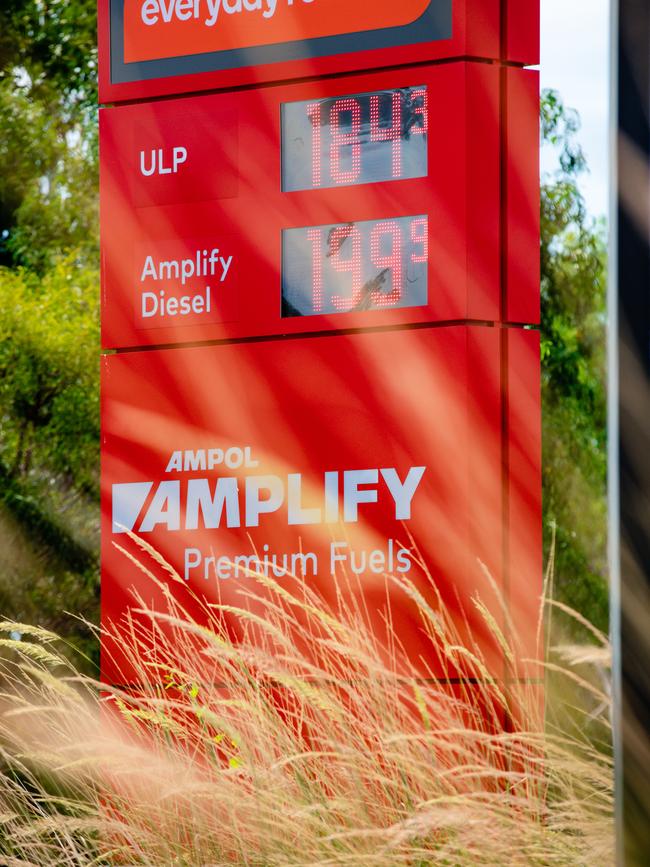
“I think we’ve given them fair time to exhaust old stocks that they had at the old price,” Mr Hill said.
“And now, since April 6, the terminal gate price has been in the low 150s.”
He said the historical fuel margin – or the extra cost service stations add to the price of fuel to cover their business – was “about seven to 10 cents a litre”.
“So there’s no reason why we shouldn’t be seeing prices in the low to mid 160s,” Mr Hill said.
Announcing a halving of the 44 cents a litre fuel excise tax last month, Federal Treasurer Josh Frydenberg promised the government would scrutinise service stations who failed to pass on the savings to consumers.
“The competition watchdog will monitor retailers to make sure these savings are passed on in full,” Mr Frydenberg said.
“This cut in fuel excise, which takes effect from midnight tonight, will flow through to the bowser over the next two weeks,” he said on March 29.
The Treasurer said the cut would save the average family $30 a week over six months.
Fuel prices globally hit record highs after Russia invaded Ukraine in February.
It has compounded a serious cost-of-living crisis, with the price of groceries also increasing in recent months.
At the time of the fuel excise tax cut, many major petrol chains promised to pass on the cuts either partially or in full to provide immediate relief at the pump for struggling Australian families.
NT to get cheaper fuel after Darwin airport receives grant
THE $30m Federal Government grant to Airport Development Group is expected to have lasting impact on petrol, according to executive general manager Ross Baynes.
ADG announced last week the Commonwealth had approved the matching grant to ADG under the Boosting Australia’s Diesel Storage Program.
The $60m project will deliver a new 80 megalitre diesel storage facility and pipeline to be build at East Arm adjacent to the existing Vopak and under-construction Crowley facilities.
Work is expected to begin next year and as well as valuable airport infrastructure, Territorians should be paying less for fuel when it’s complete.
“This will bring competition into the market where none currently exists,” Mr Baynes said.
“The only fuel storage currently is Vopak and any importer has to put their product in that facility and Vopak can charge what they see fit because there’s no competition.
“By introducing competition, storage fees will come down and we believe this will lead to cheaper prices at the bowser for everyday Territorians.”
Discussions are underway with the Land Development Corporation, which owns the planned construction site.
“The grant was part of boosting Australia’s diesel storage but as demand grows it will be an open access facility so any fuel importer can put their product in this facility. Focus will be on diesel in the early days but in the fullness of time we’ll look at diversified products whether it be jet A1 or gasoline.”
By project’s end there’ll be three or four tanks and an underground pipeline from the port will service both civilian and military operations at Darwin airport.
“The beauty of the pipeline is it provides operational resilience. It means we can refuel the tanks storage facility at the airport faster. It increases speed fourfold.”
The tank farm is another plank in ADG’s diversification strategy which has seen the company buy hotels, invest in infrastructure and manufacturing.
“ADG will continue to invest in the Northern Territory,” he said.
“When we saw the aviation business decimated by Covid, having alternate revenue streams was essential to paying the bills.”
How you can refuel for $1.70 a litre
PETROL and diesel prices in Darwin have dropped below $2 a litre for the first time in weeks, but experts have warned motorists to wait a little longer.
And the AANT has said fuel prices could fall to between $1.70 and $1.80 a litre.
Unleaded 91 hit record highs of $2.10 a litre in early March, fuelled by uncertainty over the invasion of Ukraine and supply disruptions from the Covid-19 pandemic.
In more remote parts of the Territory, motorists were being slugged $3 a litre for diesel and unleaded.
But CommSec senior economist Ryan Felsman said the combination of global factors and the federal government’s decision to slash the fuel excise tax by 22c a litre had caused prices to drop.
“In Darwin, we have seen prices of $2.09 a litre on March 29 … and it’s fallen (on Friday) to $1.98,” Mr Felsman said.
Retailers including Coles Express committed after Tuesday’s budget to passing on an immediate 10c a litre cut to fuel prices, with further decreases expected as pumps are refuelled with petrol taxed less.
Mr Felsman said motorists who could wait could save a further 10c a litre, with prices expected to fall further as the excise cut flowed through to consumers.
“My advice for Darwin is that it is a good time to fill up right now, but it may come down further,” he said.
“There’s expectations it will fall below $1.90 next week, so maybe wait until next week.”
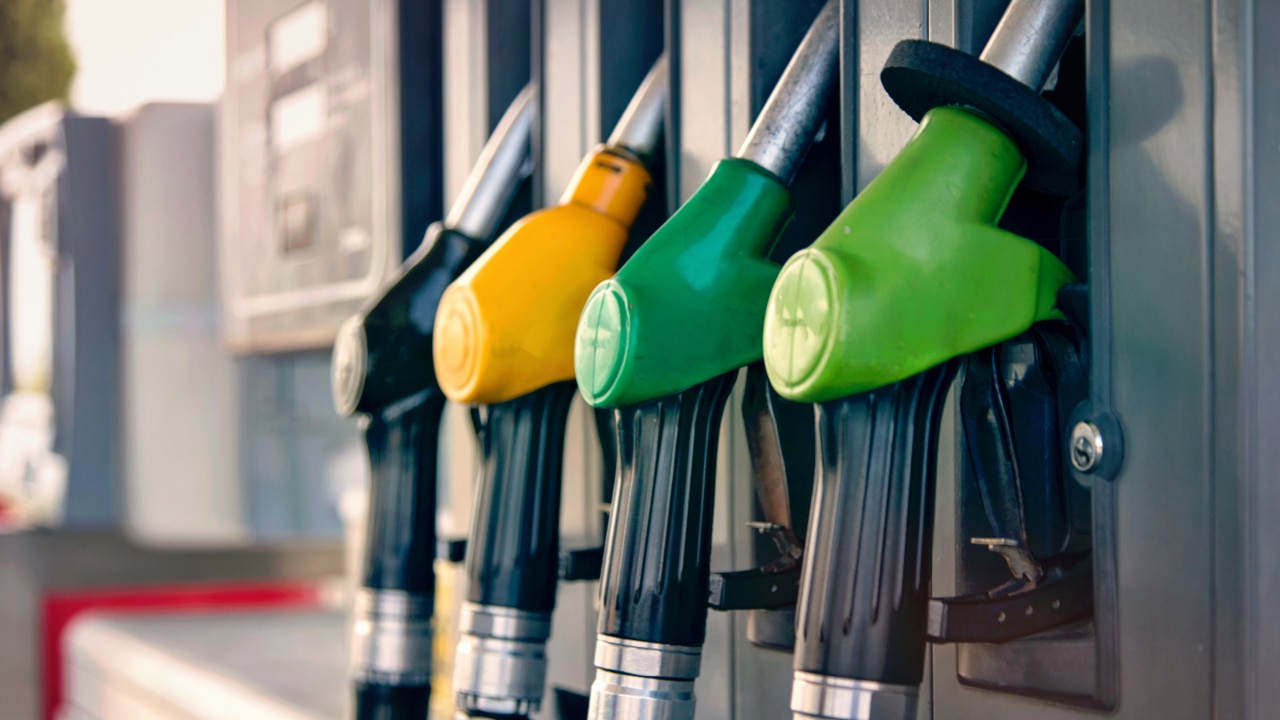
The cheapest areas for fuel were Ludmilla, Winnellie and Parap, with fuel slightly more expensive in Darwin’s CBD.
AANT senior manager of operations Edon Bell said the current terminal gate price was sitting at $1.64, and most servos added about 12c a litre to their prices to cover their costs.
“There would be no reason why, in about seven days from now, the market ought to be sitting at around the mid 170s to 180 cents-a-litre when using the previous 12c margin as a reference,” Mr Bell said.
“Within seven to 10 days, we ought to see the full excise passed on.”
Mr Bell said most service stations had already dropped their prices by 9c a litre after the federal budget.
The federal government taxes fuel at 44c a litre. In response to rising fuel prices and a cost of living crisis, Treasurer Josh Frydenberg announced an immediate 22c a litre cut to the tax in the federal budget.
MARCH 10: THE organisation representing the trucking industry in the Northern Territory has warned they’re preparing for the possibility of diesel hitting $3 a litre.
The cost of filling up with both Unleaded and diesel has continued to surge, with prices nearing $2.10 a litre at some Darwin servos.
The fuel hike is expected to flow onto supermarket shelves, with everyday items likely to become more expensive due to the Territory’s reliance on road transport.
NT Road Transport Association executive Louise Bilato said her industry was already wargaming future scenarios and talking to fuel suppliers to get a sense of how long prices were expected to stay elevated for.
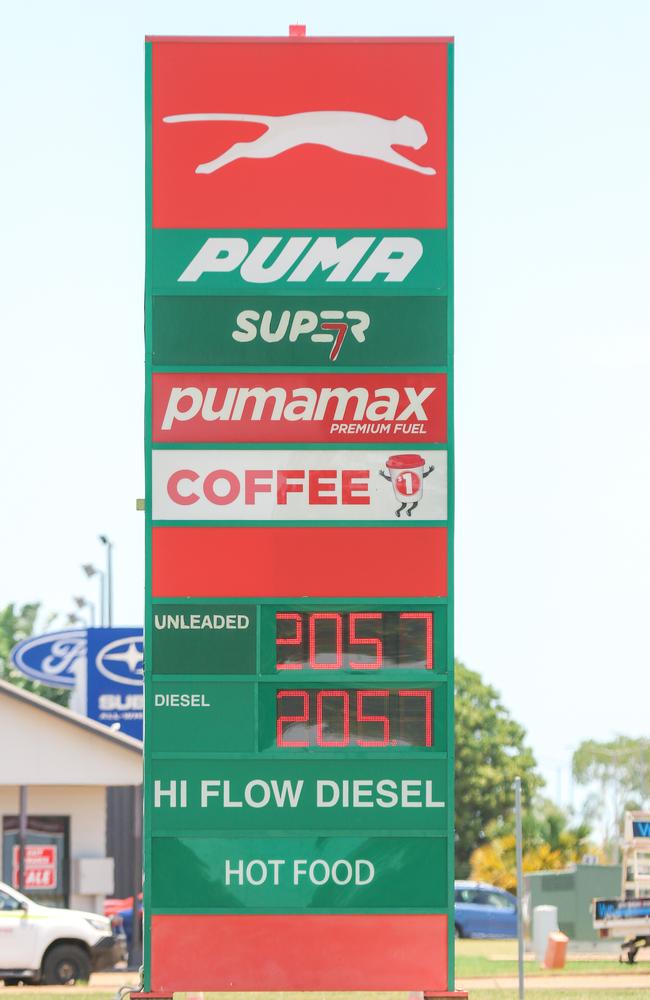
“We’re trying to look at contingencies for if the price of diesel goes to $3 a litre, what does that look like for freight,” Ms Bilato said.
“It’s hard to know whether we’re looking at short term or something that’s going ot be medium and long term. So we’re getting advice from the CEOs of fuel companies about what the fuel load in Australia looks like.”
Ms Bilato said fuel comprised of roughly 20 per cent of the costs of the average freight company, which would be passed onto consumers.

“I think they’re already seeing it. They will see it directly in every item ordered going forward.
“Everyone in Australia needs to start thinking and forward planning for what this is going to look like.”
A Woolworths spokesman said the supermarket giant had “adjusted some of our retail prices” due to wholesalers increasing their costs.
“We understand value is important to our customers and work hard to ensure our prices remain competitive in the market,” the spokesman said.
“We’ll continue to work with our suppliers to sensitively manage the whole-of-market inflationary pressure on food and groceries.”
How much NT fuel prices are expected to surge
FUEL prices in the Territory are expected to surge further, with the cost of Unleaded 91 jumping beyond $2.20 a litre interstate.
Territory-wide, the cost of both unleaded 95 and diesel was an eye-watering 212 cents per litre on Wednesday.
Petrol station boards for Coles Express and Caltex Woolworths outlets in Greater Darwin were already showing $2.01 for a litre of Unleaded 91, with other companies selling for between 195.5 and 199.7 cents per litre.
The Territory-wide seven-day average for U91 was 203.8 cents a litre, while diesel was 209.3 cents a litre.
The cost of AdBlue, which is a key additive for diesel trucks, was reportedly $2.29 a litre at some Darwin locations.
The stunning fuel price increases will be another blow to Territorians, who are already grappling with rising cost of living pressures.
Federal senator Rex Patrick has called on the federal government to halve the fuel excise tax, which costs the average household $1188 a year according to the Australian Automobile Association.
Federal Energy Minister Angus Taylor has ruled out any cut to the excise, saying its revenues were key to funding road projects.
Bellamack HiLux driver Sha`nae James said the cost of filling up her ute was up significantly compared to just a couple of weeks ago.
“(Fuel prices) are ridiculous and unaffordable. They’re nearly double what they were a few years ago,” Ms James said.
“For my car, it’s nearly $200 to fill the tank and that’s just for a week. That’s basically my rent.
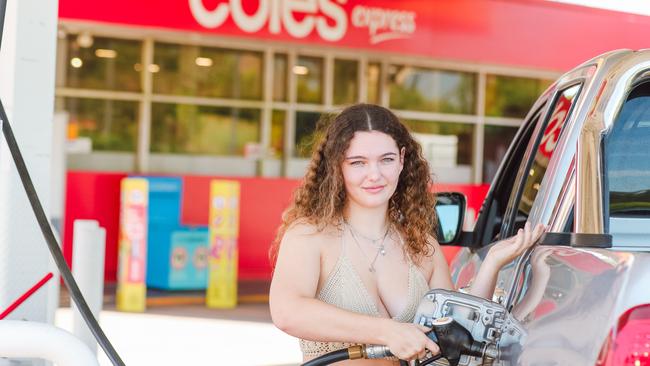
“Unless petrol prices start to come down, or at the very least stabilise, we’re very fearful that people might have to make that very difficult decision to leave the Territory.”
AANT chief executive Anthony Hill said prices hit an eight-year high on Tuesday and would undoubtedly put extra strain on Territorians’ budgets.
“Unfortunately prices may continue slightly higher still given the prices that are going on around the world,” Mr Hill said.
He recommended motorists use the MyFuelNT app to find the cheapest prices in their area.
“It can be between $5 and $10 on a fill depending on what discount you’ve got.”
A recent AANT report found that 15 per cent of an average family’s income was spent on transport costs, a figure expected to rise in the next quarterly report.
Territory Opposition Leader Lia Finocchiaro said the rise in fuel prices came in addition to other “enormous” cost of living increases.
“What we’re going to see over the coming months is additional pressure on people on the cost of living,” Ms Finocchiaro said.


